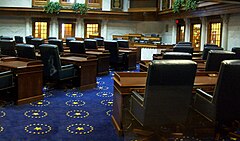Indiana Senate
The Senate of Indiana ( Indiana State Senate ) is the upper house of the Indiana General Assembly , the legislature of the US state of Indiana .
The Chamber of Parliament is composed of 50 members, each representing an electoral district. The MPs are each elected for four-year terms; there is no limit to the terms of office.
The Senate boardroom, along with the House of Representatives, is located in the Indiana Statehouse in the capital Indianapolis .
Indiana Articles of Association
The Indiana Senate operates according to a developed domestic policy, as well as largely maintaining tradition. These guidelines are the same as those governing the upper houses in most state senates in the United States . The first official working day of the Senate in a year takes place on the first Tuesday after the first Monday in January. In the uneven years, the Senate has to meet on 61 days (not necessarily afterwards), but this should happen by April 30th at the latest. This is commonly called "a long session" in the vernacular. In the even years in which the elections are held, the Senate must meet for 30 days (not necessarily afterwards), but this should happen by March 15 at the latest. This is commonly called "a short session". The only time the Senate can meet outside of this date is when the governor calls a special session.
The Senate must be there by 1:30 p.m. on each scheduled day of the meeting. Two thirds of the Senate must be present at a session for it to begin. Senators must be present at every meeting unless excused by the President Pro Tempore . MPs who are not present can be forced to attend the sessions after all or be expelled from the Chamber.
The Indiana Lieutenant Governor is the President of the Senate and is responsible for ensuring that Senate policies are followed by his MPs. He only takes part in votes in order to bring about a decision in the event of a stalemate. In the absence of the Vice-Governor, the respective President Pro Tempore presides over the plenary sessions. This is elected by the majority parliamentary group in the Senate and later confirmed by the Chamber. He is largely responsible for the Senate agenda.
When a debate arises in the Senate, each Senator is given permission to speak on the case. A Senator may not speak more than once on an issue without approval from the rest of the Senate, which was obtained through a Senate vote. A senator cannot speak for more than half an hour at any time. Furthermore, he can be silenced at any time during his speech by a majority of votes.
conditions
The Senate cannot have more than fifty MPs under Article 4 of the Indiana Constitution. A senator's term of office is four years, with 25 senators being elected every two years. However, there is no limit to how often a senator can be elected.
requirements
Under Article 4 of the Constitution, a Senator candidate must have been a citizen of the United States for at least two years prior to running, have resided in the constituency for at least one year, be 25 when he was sworn in, and may serve in the Senate during his tenure do not hold any other public office in the state or the federal government.
Composition after the election in 2008
- Democrats : 9
- Republicans : 41
| Political party | MPs | |
|---|---|---|
| Republican Party | 41 | |
| Democratic Party | 9 | |
| total | 50 | |
| majority | 32 | |
Important members of the Senate
| position | Surname | Political party |
|---|---|---|
| president | Becky Skillman | republican |
| President Pro Tempore | David C. Long | republican |
| Majority Leader | Connie Lawson | republican |
| Whip the majority faction | Brandt Hershman | republican |
| Opposition leader / minority leader | Vi Simpson | democrat |
| Whip the opposition | Timothy Lanane | democrat |
Web links
-
Indiana General Assembly - Senate (English)
- Indiana Senate Democrats (English)
- Indiana Senate Republicans (English)
- Project Vote Smart - Senate of Indiana (English)
